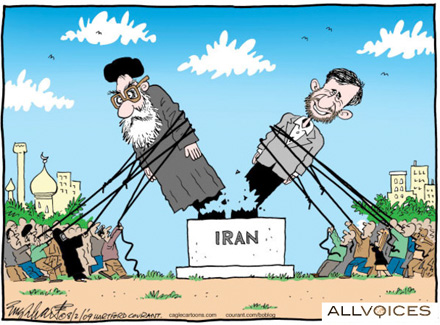
The events in Egypt in the past week has given the government of the Resolute Nation a pretext to tout its own horn as a mover and inspiration for what is going on in the Arab world. According to the BBC Persian, the Iranian media in the last few days hve been taking to the claim that the developments in Egypt and Tunis are reflections of the Iran’s revolution in Bahman of 1357. This level of cheek (roo) is so obscene that it deserves a hearty shishaki.
Shishaki does not have a word-equivalent in English. It refers to making an insulting noise with the mouth, by passing air through a curled in index finger against the thumb. The sound mimics flatulence and it comes in a variety of pitches. In the U.S., such expressions are commonly known as raspberry or Bronx cheer. In Persian, however, the term is not a cheer; it is used to cut down a baseless arrogant, supercilious or haughty proclamation like gondehguzi and poz-e bija.
If the context requires, a shishaki can be followed by the utterance ridi, which means the arrogant one has just soiled himself. In English, one is simply content by stating that the windbag is simply full of it.
If the Iranian revolution is the inspiration for the Tunisian and Egyptian streets, then what inspired the Iranian revolution? The Solidarity movement in Poland? And do we go as far back as the French Revolution and from it to the birth of the American republic? Oops!
The Iranian bravado honar nazd-e Iranian ast to bas proclaims that only Iranians possess the artistic. An equally meaningful boast is the one in which Iran is touted as the cradle of wireless technology, because no wire is said to be found anywhere in its ancient ruins. Maybe so, but let’s face it, Iran is also the death place of great ideas.
A few years prior to the 1979 revolution, the Iranian leadership became suspicious of Soviet intentions in Iran; Moscow and its satellites had begun to court the Iranian Communists and the Left with greater regularity. The Shah would state often that he would not sit idle in the face of efforts to turn the country into another Iranestan. Already twice Iran had been occupied by the Soviets, a repeat that shan’t three-peat (do-y keh setah nakhahad shod).
In the lukewarm state of Irano-Soviet relations, the one-time Iranian ambassador asked a Kremlin official if the Soviet Union intended to turn Iran into a Communist country? The Russian replied in the negative and added, “That would be a sure fire way to destroy Communism!” Then the Russian asked the ambassador to explain the Shah’s recent request for sophisticated weaponry from the United States. “Do you intend to invade us,” the Russian asked. “No,” replied the ambassador, “we have legitimate self-defense needs.” In a characteristically arrogant Soviet style, the Russian asked, ‘Do you think that these American weapons will be enough to stop us from rolling into Iran?” The ambassador replied, “Are you intending to roll into Iran?” When the Russian replied in the negative, the ambassador said “So, I guess it is enough for you, too.”
The theocracy that Iran has set up has done to Islamist rule what the Soviet feared the Iranization of Communism would do to Communism — that is, to turn it into an unworkable model. The Caliphs who ruled an empire from the Indus to Maghreb and parts of Europe were savvy enough to let the governmental and temporal affairs of the empire be governed by “secular” administrators, many of whom happened to be also rulers of Persia like the Buyids and Seljuqs. In fact, the political theories that allowed for such a separation of the religious (spiritual) and political were expounded by a number of Iranian jurists and thinkers. In light of that heritage, the 1979 revolution instead produced a kingship of the turban, stitched together by threads of white beards of the “righteous” ones.
Nay, the Iranian revolution is not what anyone would want to emulate. If there is any inspiration at all that emanates from Iran is the promise that social media and legitimate electoral and other grievances can galvanize the people into political action – like the one that followed the disputed elections in Iran two years ago. What the Arab street may add to that lesson is how to bring it all home.
While the Iranian leadership is out there issuing proclamations of support for the aspirations of the Arab peoples, it may want to consider the hypocrisy of its own treatments of dissent inside Iran. Where the demonstrators in Iran demanding more than the protestors want to see in Egypt and Tunisia? Physician, first heal thyself.






